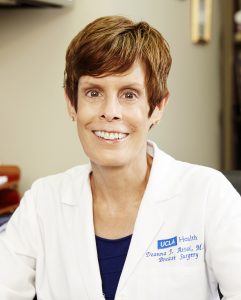The role of social media in cancer care

To mark our focus on social media in cancer care we recently spoke with Deanna Attai from the University of California (CA, USA) about the potential use of social media in cancer care including how oncologists can incorporate social media into their care plans as well as the opportunities and risks they should be aware of.
You have previously written on social media in cancer care: highlights, challenges & opportunities. In your opinion, what are some of the benefits of utilizing social media in cancer care?
There are many benefits to utilizing social media in cancer care. Probably the top for me is using Twitter specifically to help filter information. By following specific journals as well as other physicians and researchers who share common interests, my network brings relevant content to me. I find it much more efficient than my old method of reviewing multiple journals to find articles of interest. I do skim the journals that come in the mail but most of the time I find I’ve already come across the relevant articles online.
“There is enormous potential for networking and collaboration with physicians across multiple specialties for those who utilize social media.”
In addition, I am exposed to content I might not otherwise seek out. I do not read journals specific to colorectal cancer for example but there may be articles in those journals on a topic relevant to me as an oncology physician. I am also more likely to review articles on medical education and other topics of general interest if I come across them in my Twitter feed. You can only subscribe to so many journals, but if you are deliberate in who you listen to (follow) on Twitter, you will come across a significant amount of information that is relevant and interesting.
Another often overlooked benefit of social media is the personal connection. Many criticize social media for being impersonal and I’ve found it to be completely the opposite. I do not think I would have met any of my COSMO collaborators if it were not for Twitter – I met all of them online before we had the chance to meet in person. There is enormous potential for networking and collaboration with physicians across multiple specialties for those who utilize social media.
I’m often asked why I bother spending so much time sharing info online. Woke up to a lovely comment on my practice FB page – THIS is why I tweet ->
— Dr. Deanna Attai (@DrAttai) January 4, 2018
You are the co-moderator of a breast cancer support community on Twitter – Breast Cancer Social Media (#BCSM). Could you tell us more about this group?
The #BCSM community was founded in 2011 by breast cancer survivors Alicia Staley (@stales) and Jody Schoger (@jodyms). They initially “met” on Twitter, and participated in conversations about cancer and social media. They felt it was important to have breast cancer specific discussions, and #BCSM was born. I came aboard as co-moderator a few months after the chats started and I’m proud to say that many other physicians now regularly join the discussions – both to help educate the patient community as well as learn from them. #BCSM is more than a weekly tweet chat – it is a full-fledged online support community. July 4th 2017 wlll be #BCSM’s 6th birthday – and the community is still going strong. Jody Schoger passed away from metastatic breast cancer in May 2016.
What steps could clinicians take to incorporate social media into their care plans?
The first step is often the most challenging – just set up an account. There are many articles and slideshare presentations to help you get started. Once online, follow a few physicians, institutions and organizations. I always recommend “lurking” for a little bit – just sit back and watch – to get a feel for how a specific social media platform works. Then jump in and join the conversation! Once online, a physician will find that there are many willing to guide and support the new user.
Dr. Matthew Katz (MD Anderson Cancer Center, TX, USA), a member of COSMO, has some slidesharesresources for those looking for further information: Twitter 101, 102 and 103 that cover signing up, account settings, and “trolls”, malware and spam. They can be found on his slideshare account: https://www.slideshare.net/subatomicdoc
What risks should clinicians be aware of regarding the use of social media?
The most important thing for a physician to realize is that all online postings are potentially public, and may be seen by a large audience. Even with privacy settings enabled, there is no true privacy on the internet. Having a small number of followers does not mean your posts won’t be widely shared.
A good rule of thumb is that physicians should behave in the online world how they are expected to in the real world – in a respectful, professional manner. That does not mean you can’t discuss sports, current events and other non-medical topics. Just keep in mind that you are seen online as a physician – and a certain level of professional behaviour is expected.
Patient specific information should simply not be discussed unless you are on a physician-specific, HIPAA-compliant site such as Doximity. Even discussing a case in general terms such as “I saw a patient with XYZ disease today” could potentially be traced back to identify the individual patient. Case discussions on public forums should only be discussed in general terms.
You are part of the Collaborative for Outcomes in Social Media in Oncology (COSMO). Could you tell us about this group?
As we got more interested in and excited by the potential uses of social media in oncology, we felt that a more formal approach was needed. There is no standardization regarding metrics and there is minimal evidence that social media improves the oncology professional’s experience or improves the patient experience. Dr. Don Dizon who is a medical oncologist at the Massachusetts General Hospital, proposed that we develop a collaborative to help formulate “ground rules” for evaluating social media and to collaborate on projects to contribute on evidence, as well as to become a resource for other physicians and investigators. Our goal is to investigate, describe and inform the cancer community of the potential value of health communications in social media.
“Our goal is to investigate, describe and inform the cancer community of the potential value of health communications in social media.”
Any closing comments for our readers?
There are many benefits to the use of social media by oncology physicians. I think many physicians are intimidated by concerns about time management, privacy and learning new technology. My advice would be if you are interested, reach out to any of us who have successfully incorporated social media into our professional workflow. We’re happy to help!
Could you provide us with a brief overview of your career to date?
After finishing general surgery residency in 1995 (Georgetown), I joined a group practice in the Northern Virginia area, just outside of Washington, DC. In 1999 I moved to Los Angeles to join a general surgery practice. I started a solo private practice in 2003 and in 2004 transitioned to a breast surgery practice. In 2014, I joined the faculty of the University of California (UCLA. I remain however in a community practice setting in Burbank, California.
In addition to my clinical practice, I have been actively involved in the American Society of Breast Surgeons (ASBrS), serving as a committee chair and on the board of directors and the executive committee. I served as President from 2015 – 2016. I joined Twitter in 2010, at the time I was Chair of the ASBrS Communications Committee and we were looking to develop a social media presence for the organization but I had no online experience with Twitter, Facebook or other platforms. What started as an exercise to simply learn more about how those sites worked certainly turned into something much larger, and in a relatively short period of time.
Profile:
 Dr. Deanna J. Attai is an Assistant Clinical Professor of Surgery at the David Geffen School of Medicine at the University of California Los Angeles, and is a Past- President of the American Society of Breast Surgeons. After completing her undergraduate education at Vassar College, she graduated with honors from the Georgetown University School of Medicine, and then completed her General Surgery Residency at Georgetown University Hospital. Her surgical practice is limited to the care of patients with benign and malignant breast disease.
Dr. Deanna J. Attai is an Assistant Clinical Professor of Surgery at the David Geffen School of Medicine at the University of California Los Angeles, and is a Past- President of the American Society of Breast Surgeons. After completing her undergraduate education at Vassar College, she graduated with honors from the Georgetown University School of Medicine, and then completed her General Surgery Residency at Georgetown University Hospital. Her surgical practice is limited to the care of patients with benign and malignant breast disease.




